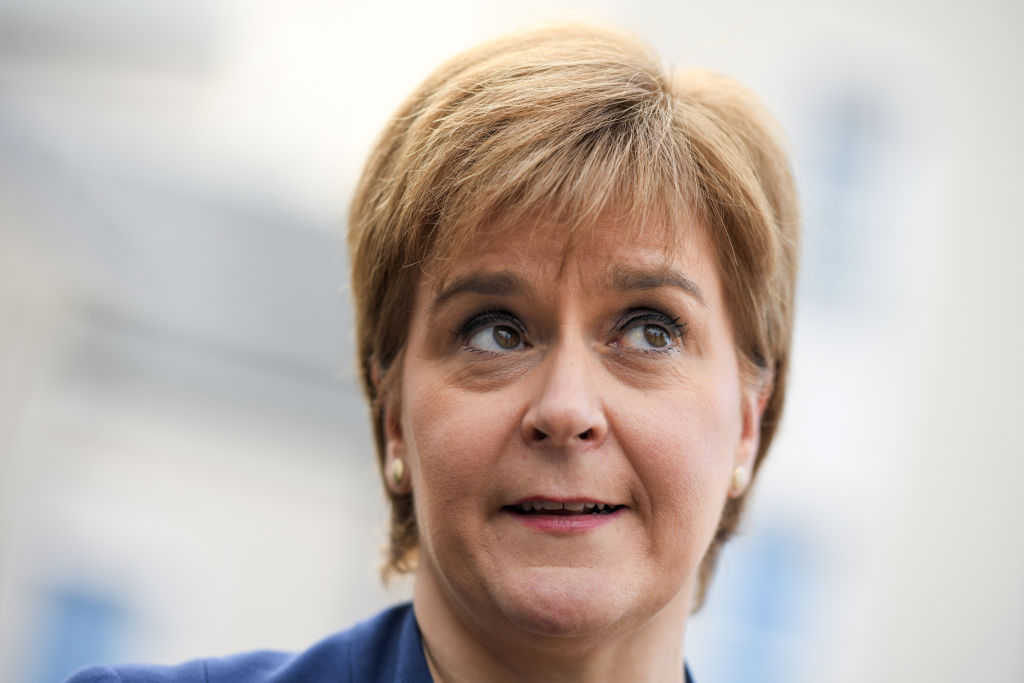What’s Nicola Sturgeon playing at on Brexit? Quick answer: politics. Longer answer: politics.
The SNP leader has rejected a deal to resolve the impasse between Westminster and Holyrood over the repatriation of powers from Brussels. She accuses the Tories of a ‘power grab’ because some areas of responsibility will initially go to the UK rather than Scottish parliament and threatens to deny consent to the government’s Brexit Bill. If she does so – and her SNP holds a majority of seats at Holyrood with unofficial junior coalition partners, the Greens – it will fix a procedural wheel clamp on Brexit. At which point, the only way the Bill could go ahead is if Westminster explicitly overruled the Scottish Parliament.
You see where I’m going with this? Nicola Sturgeon started the Brexit process with 56 MPs, a majority of Scots behind her and the moral high ground in seeking to keep the UK in the single market and customs union, neither of which the British people had voted to leave, what with them not being on the ballot paper (and which Scots definitely hadn’t voted to leave, with Remain taking 62 per cent of the vote). The Scottish commentariat was almost in lockstep behind her and even some political foes broke ranks to back her. The First Minister was in a position of strength and had leverage with Downing Street.
But she blew it. Sturgeon’s demand for a second referendum on independence was calculated to seize the opportunity, placate her hardline grassroots, and maybe even get out of the UK before Brexit and skip any transition period to a separate Scotland’s EU accession. However, the risks of her gamble were pretty obvious. Scots had rejected separation just two years previously, a vote Sturgeon had repeatedly characterised as ‘once in a generation’ and ‘once in a lifetime’. The public were unconvinced of the case for Indyref2 and Westminster would never agree to it. A large minority of SNP supporters had voted Leave and Scots, though hostile to Brexit, were beginning to tell pollsters they opposed a differential deal on immigration and trade. In the end, they tired of constant constitutional agitation and sent 21 SNP MPs packing.
Unlike Labour, Sturgeon has been decisive on Brexit. The only problem is that most of her decisions have been the wrong ones. Almost every intervention has made Scotland’s departure from the EU more, not less likely. There is a case to be made that, had she simply said nothing on the matter for the past two years, the cause of Scotland in Europe would be, at worst, in the same position it is today, if not measurably better. The figurehead of Scottish nationalism has managed to turn independence from a semi-plausible escape route into a voter-repelling dead end. She has hardened the prejudices of her opponents, tested the patience of her Leave-voting supporters, and even prompted a few grumbles of discontent in a party with an omertà that makes the Corleone family look like snitch central.
Now she has decided to rebuff the deal offered by Westminster, even though the Welsh Government has accepted it. Sturgeon and Welsh first minister Carwyn Jones have been challenging Westminster in tandem and the Nationalists explicitly tied their case to that of Cardiff Bay. As Sturgeon’s Brexit minister Mike Russell told Holyrood in September:
‘We are working very closely with Wales, and we cannot envisage a situation in which Scotland would be content and Wales would not be, or vice versa.’
Why, then, has Sturgeon chosen to isolate herself even from her allies and continue dangling her spanner over the machinery of Brexit? There are two reasons and both are political. The simplest and quickest to explain is that her obstinacy ups the chances of a constitutional showdown. The propaganda potential of a minority Tory government slapping down the Scottish Parliament is obvious. The SNP collects grievances like Charles Saatchi collects bad art. The opportunity to tell Scots they are being pushed around by the Engl– um… Westminster is one they will not pass up.
The other reason, which takes longer to explain, is that, in her own roundabout way, Sturgeon believes she is standing on a matter of principle. The devolution settlement must be respected and powers that belong at Holyrood should go there. Of course, the First Minister’s dedication to political niceties is intermittent. Her official visits to foreign countries, allocation of an international affairs budget, and her government’s use of public resources to opine on events overseas seemingly do not jeopardise the same devolution settlement, which reserves foreign policy to Westminster. Besides, if the UK Parliament devolved these Brussels powers tomorrow, Sturgeon’s ministers would be on the phone asking them to hold off for a while longer.
Still, Sturgeon recognises what a prolonged transition period would mean and in this she shows more foresight than her Westminster counterparts. The retention – even temporarily – of powers which should reside at Holyrood will, through remoteness and bureaucracy, make the regulation of some industries (fishing, agriculture) more inefficient and make it more difficult for the Scottish Government to intervene effectively when support is needed. It will set her administration up for routine disputes with national government, and while ministers down south take the decisions the SNP will likely take the blame when things go wrong. The First Minister likes grievances but the kind that inhibit other governments, not her own.
It’s all in vain, though. Brexit is happening and there’s nothing Nicola Sturgeon can do to stop it. There are no rabbits left in this hat. She isn’t trying to scupper it, of course. She’s trying to stall it, fend it off for just one more day, then another, and another, because she has run out of road. The First Minister’s response to Brexit has utterly and comprehensively failed. She’s just not ready to admit it to herself.







Comments